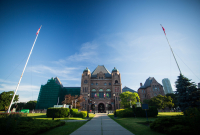Support strong Canadian climate journalism for 2025
Green law charity Ecojustice is urging the Ontario government to undo the province’s dismantling of environmental protections during the COVID-19 pandemic, calling them an unnecessary overreach that leaves the public in the dark.
On April 1, citing the pandemic, the government suspended a broad swath of environmental protection law, effectively allowing the province to push forward environmentally significant projects or policy changes — even those that don’t relate to COVID-19 — without consulting or notifying the public.
But the law already allows the government to skip public consultation if a public health emergency demands it, said Ecojustice staff lawyer Rob Wright. The only conditions are that the government notifies the auditor general and the public and explains its reasoning — stipulations that aren’t included in the exemption Ontario passed last month.
“Things that are not COVID-19 related can be proposed without there being public knowledge,” Wright said.
“That’s way overreaching what’s needed to deal with the COVID emergency.”
The exemption suspends a large swath of the Environmental Bill of Rights, a piece of legislation that gives the public the power to have a say in environment-related decision-making and hold the government accountable for what it does or fails to do. The exemption expires 30 days after Ontario’s current state of emergency ends (the state of emergency is currently extended to June 2, but the government can choose to leave it in place longer as the pandemic continues).
Andrew Buttigieg, a spokesperson for Environment Minister Jeff Yurek, said the government chose to suspend part of the Environmental Bill of Rights because the built-in emergency exemption might not cover all measures the government could need to address COVID-19. (When asked by National Observer last month, Buttigieg didn’t give examples of what kind of projects or measures the loosened rules would be used for.)
He also said the avenue the government chose is more efficient; the time it would take to assess whether the emergency exemption applies “has the potential to add procedural delays in a context where urgent decision-making is necessary,” Buttigieg said.
“This will ensure our government can quickly respond to the needs of regulated businesses that may be experiencing impacts due to COVID-19, so they can continue important operations and ensure goods and services can be delivered to people in Ontario.”
“It’s really the fear of the unknown,” Wright said. “We won’t know if there’s a major or minor decision.”

Government used exemption to change greenhouse gas reporting deadlines
Ecojustice filed its application for a review of the rollbacks on May 14, acting on behalf of Canadian Association of Physicians for the Environment, and Gord Miller, a former Ontario environmental commissioner.
The environmental commissioner is an independent watchdog role. Miller, who held the position for 15 years under Progressive Conservative and Liberal governments, said he worries the rollbacks will be used to make changes that can’t be undone and won’t be discovered for months or years.
For example, he said, the government could quietly approve environmentally harmful projects such as mines. It could also change policies that protect vital ecosystems.
“A forest could get cut down and no one will know until it’s done,” Miller said.
Dr. Samantha Green, a practicing family doctor and board member at the non-profit Canadian Physicians for the Environment, said the exemptions could be used to allow air pollution increases that could cause higher rates of heart and lung disease. That could undermine public health efforts, she said — especially as studies have shown COVID-19 hits high-pollution areas harder.
It also denies the public the chance to weigh in and voice concerns about such changes, she added.
“We know there’s a direct link between air pollution and mortality,” Dr. Green said. “I see this as a disingenuous use of the COVID crisis.”
Last week, using the exemption, the Progressive Conservative government gave industry an extension on deadlines for reporting their greenhouse gas emissions. The switch aligns Ontario with a similar federal extension that was granted in April, the province said.
“This is exactly why I sounded the alarm when the environment minister removed public oversight of environmental decisions last month,” said Ontario Green Party Leader Mike Schreiner in a statement Tuesday. “He should explain to us why the COVID-19 pandemic should stop Ontario from tracking pollution.”
The extension for greenhouse gas emissions reporting was posted publicly. When asked if the government had used the exemption to make any changes that it hadn’t told the public about, Buttigieg did not provide a direct answer.
“We are committed to continuing public transparency on environmental decision-making during this temporary measure and will continue to post information notices on the Environmental Registry for measures that are related to COVID-19,” he said.
“During this time, ministries are expected to continue to post regular proposal notices, with public consultation, for matters that do not require the same urgent action.”
Miller said the public has no guarantee the government will keep its word, as the exemption means it doesn’t have to.
“We’re in a blackout period,” he said.
Minister has 60 days to decide whether to review decision
Ecojustice’s application for Yurek to review the rollbacks falls under a section of the Environmental Bill of Rights that hasn’t been suspended by the government.
Before Premier Doug Ford’s Progressive Conservatives were elected in 2018, such a move had more power. Reviews used to be conducted by the environmental commissioner, whose position the Ford government gutted last year.
Now, that responsibility falls to the minister whose department made the decision, meaning the government is effectively policing itself.
“It’s not got the teeth it would’ve had back in the old days,” Wright said of the application. “But it’s powerful.”
Yurek now has 60 days to decide whether the issue merits a review. If it does, the province must give Ecojustice a reply within 30 days of completing the probe.






Comments